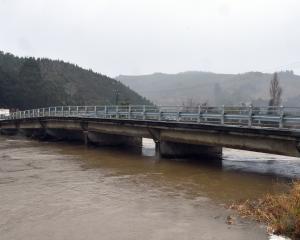District councils around Otago have received early indications of how much government funding for roading they will receive over the next three years, leaving some council staff wondering how they will make ends meet.
Though funding will not officially be announced until August, the Central Otago and Clutha district councils were told they would probably receive about $2 million each less than requested.
"We are expecting some impact on our level of service," Clutha District Council assets manager Jules Witt said.
The Queenstown Lakes District Council did not have all the figures but was facing a shortfall of $8 million in one funding sector alone and further shortfalls of several hundred thousand dollars in other areas.
Queenstown Lakes council transport manager Denis Mander said it was likely they would cope by using a "combination of deferrals and maintaining [the roads] in a different way".
The Waitaki District Council, on the other hand, seemingly gets off lightly, with indications from the New Zealand Transport Agency showing it will probably get all it asked for.
Waitaki council assets group manager Neil Jorgensen said the council had taken into account the agency's "strong message" that the pool of money available would be similar to that in the previous three-year period.
Despite that, increased fuel, bitumen and staff costs would be incurred and, therefore, there would actually be less money available for the roads.
The agency told all councils in March that no more funding would be available for the Southern region (from Christchurch south, including the West Coast) in the coming three years than was given in the previous three.
The councils revised budgets accordingly but now, after seeing the early indications from the agency, some will have to re-evaluate.
In Central Otago, that means councillors will have to prioritise various issues and decide where to spend the money.
Central Otago District Council roading manager Julie Muir said it was too early to say what work would be deferred but it was likely to be regravelling of the council's almost 1400km of gravel roads.
"People want roads gravelled and we aren't in a position to gravel all the roads that we would like to ... because of funding," she said.
The council asked the agency for $21.43 million but Ms Muir said indications from the agency showed it would only receive just over $19 million, which was still more than the $18.53 million it received in 2009-12 but not enough to cover all the work .
The agency would sign off on those figures in August but, in the meantime, the council would again be re-evaluating their roading budgets.
"While determining which roads need work is an operational matter, as funding becomes constrained, there is an increasing need to make decisions resulting in work which would previously have been done being deferred.
"It is therefore important to have a prioritisation process that will be consistently applied and is transparent," she said in a report to council.
She suggested each issue be rated as high, medium or low priority after being measured against three factors: condition, strategic importance and accessibility and safety.
Work with the highest priority would be undertaken within the funding constraints.
Councillors will consider her report today.












